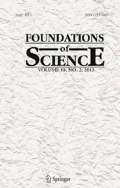Abstract
The reductionist/holist debate is highly polarised. I propose an intermediate position of pragmatic holism. It derives from two claims: firstly, that irrespective of whether all natural systems are theoretically reducible, for many systems it is utterly impractical to attempt such a reduction, and secondly, that regardless of whether irreducible 'wholes’ exist, it is vain to try and prove this. This position illuminates the debate along new pragmatic lines by refocussing attention on the underlying heuristics of learning about the natural world.
Similar content being viewed by others
REFERENCES
Barwise, J. and J. Perry: 1983, Situations and Attitudes. Cambridge, MA: MIT Press, 352 pp.
Bremermann, H.J.: 1967, Quantal Noise and Information. 5th Berkeley Symposium on Mathematical Statistics and Probability 4: 15-20.
Chaitin, G.J.: 1995, Randomness in Arithmetic and the Decline and Fall of Reductionism in Pure Mathematics. In J. Cornwell (ed.), Nature's Imagination. Oxford University Press, 27-44. http://www.cs.auckland.ac.nz/CDMTCS/chaitin/unm.html
Cutland, N.J.: 1980, Computability. Cambridge: Cambridge University Press.
Edmonds, B.: 1997, The Possible Irreducibility of Software Artificial Life. CPM Report 97-14, MMU, UK. http://www.cpm.mmu.ac.uk/cpmrep14.html
Edmonds, B.: 1999, What is Complexity? — the Philosophy of Complexity per se with Application to Some Examples in Evolution. In F. Heylighen and D. Aerts (eds.), The Evolution of Complexity. Dordrecht: Kluwer. http://www.cpm.mmu.ac.uk/~bruce/evolcomp/
Edmonds, B.: in press, Capturing Social Embeddedness — a Constructivist Approach. Adaptive Behavior 7(3/4). http://www.cpm.mmu.ac.uk/cpmrep34.html
Fishler, M.A. and O. Firschein: 1987, Intelligence in Eye, the Brain and the Computer. Reading, MA: Addison-Wesley.
Gabbay, D.M.: 1994, Classical vs Non-classical Logics (The Universality of Classical Logic). In D.M. Gabbay, C.J. Hogger and J.A. Robinson (eds.), Handbook of Logic, in Artificial Intelligence and Logic Programming, Vol. 2. Oxford: OUP, 359-500.
Gaines, B.R.: 1976, On the Complexity of Casual Models. IEEE Transactions on Systems, Man and Cybernetics 6: 56-59.
Gödel, K.: 1931, Uber formal unentscheidbare Satze der Principia Mathematica und verwandter System I. Monatschefte Math. Phys. 38: 173-198.
Harnad, S.: 1990, The Symbol Grounding Problem. Physica D 42: 335-346. http://cogprints.soton.ac.uk/abs/psyc/199803014
Kampis, G.: 1991, Self-Modifying Systems in Biology and Cognitive Science: A New Framework for Dynamics, Information and Complexity. Oxford: Pergamon Press, 565 pp.
Kampis, G.: 1995, Computability, Self-Reference, and Self-Amendment. Communication and Cognition — Artificial Intelligence 12: 91-109. http://www.c3.lanl.gov/_rocha/kampis.html
Löfgren, L.: 1968, An Axiomatic Explanation of complete Self-Reproduction. Bull. Math. Biophys. 30: 415-425.
Marquis, J-P.: 1995, Category Theory and the Foundations of Mathematics: Philosophical Excavations. Synthese 103: 421-447.
Pattee, H.H.: 1995, Evolving Self-Reference: Matter, Symbols and Semantic Closure. Communication and Cognition — Artificial Intelligence 12: 9-27. http://ssie.binghamton.edu/~pattee/sem_clos.html
Penrose, R.: 1996, Beyond the Doubting of a Shadow: A Reply to Commentaries on Shadows of the Mind. Psyche 2(23). http://psyche.cs.monash.edu.au/volume2-1/psyche-96-2-23-shadows-10-penrose.html
Rosen, R.: 1985, Organisms as Causal Systems Which Are Not Mechanisms: An Essay into the Nature of Complexity. In R. Rosen (ed.), Theoretical Biology and Complexity: Three Essays on the Natural Philosophy of Complex Systems. London: Academic Press, 165-203.
Rosen, R.: 1991, Life Itself — A Comprehensive Enquiry into the Nature, Origin and Fabrication of Life. New York: Columbia University Press.
Rosen, R.: 1993, Bionics Revisited. In H. Haken, A. Karlquist and U. Svedin (eds.), The Machine as Metaphor and Tool. Berlin: Springer-Verlag, 87-100.
Rotman, B.: 1993, Taking God Out of Mathematics and Putting the Body Back In. Stanford, CA: Stanford University Press.
Sarkar, S.: 1992, Models of Reduction and Categories of Reductionism. Synthese 91: 167-194.
Siegelmann, H.T.: 1995, Computation Beyond the Turing Limit. Science 268: 545-548.
Simon, H.A.: 1981, The Architecture of Complexity. In The Sciences of the Artificial. Cambridge, Massachusetts: MIT Press, 192-229.
Turing, A.M.: 1936, On Computable Numbers, with an Application to the Entscheidungsproblem. Proc. London Math. Soc. 2(42): 230-265.
Von Fœrster: 1960, Self-Organising Systems and Their Environments. In M.C. Yovits and S. Cameron (eds.), Self-Organising Systems. Pergamon Press, 2-22.
Von Neumann, J.: 1956, Probabilistic Logic and the Synthesis of Reliable Organisms from Unreliable Parts. In C.E. Shannon (ed.), Automata Studies. Princeton: Princeton University Press, 43-98.
Weinberg, S.: 1977, The First Three Minutes. New York: Basic Books.
Wimsatt, W.: 1972, Complexity and Organisation. In K. Schaffner and R. Cohen (eds.), Studies in the Philosophy of Sciences, Vol. 20. Dordrecht: Reidel, 67-86.
Wolfram, S.: 1984, Cellular Automata as Models of Complexity. Nature 311: 419-424. http://www.wolfram.com/s.wolfram/articles/84-cellular/summary.html
Wolfram, S.: 1985, Cryptography with Cellular Automata. CRYPTO '85 Proceedings: Advances in Cryptography, Santa Barbara, California; Lecture Notes in Computer Science 218: 429-432. http://www.wolfram.com/s.wolfram/articles/85-cryptography/summary.html
Wolfram, S.: 1986, Random Sequence Generation by Cellular Automata. Advances in Applied Mathematics 7: 123-169. http://www.wolfram.com/s.wolfram/articles/86-random/summary.html
Yates, F.E.: 1978, Complexity and the Limits to Knowledge. American Journal of Physiology 235: R201-R204.
Author information
Authors and Affiliations
Rights and permissions
About this article
Cite this article
Edmonds, B. Pragmatic Holism (or pragmatic reductionism). Foundations of Science 4, 57–82 (1999). https://doi.org/10.1023/A:1009642920187
Issue Date:
DOI: https://doi.org/10.1023/A:1009642920187



